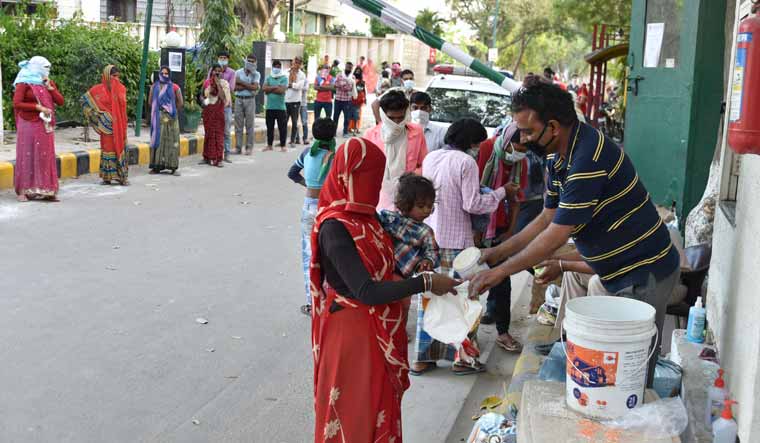One day into the initiative to distribute food grain in Uttar Pradesh, experts feel that the situation calls for universal coverage such as the one practised by states like Kerala.
Arundhati Dhuru, former adviser to the Supreme Court of India on Right To Food told THE WEEK, “This is a time for the government to provide food to everyone in need. Any identity card should do for that.”
On Wednesday, states started distribution of food to Antyodaya Card holders, labourers under the Mahatma Gandhi National Rural Employment Guarantee Act (MGNREGA), workers registered with the Labour Department and daily wagers registered with the Urban Development Department.
Dhuru pointed out that those who fall under the said categories add up to a very small proportion of the population which is in need of food during the ongoing COVID19 pandemic.
“The Antyodaya quota is fixed and it is near impossible to make changes in that. It has not been made clear by the government if only active MGNREGA card holders (those who have found employment under the Act in the last year) will benefit from it. It does not address the issue of urban poor who do not have MGNREGA cards. Neither does it take into account artisans such as zari workers who are not registered with any department”, she said.
The size of the population of the poor in Uttar Pradesh makes the task of providing emergency relief challenging. As per the Niti Ayog’s Sustainable Development Goals Index and Dashborad, 2019-20 (see https://niti.gov.in/sites/default/files/2019-12/SDG-India-Index-2.0_27-Dec.pdf ) the state is among the five states in the bottom of the list when it comes to meeting the goal of 'Zero Hunger'. The same report also puts the state among the the last four when it comes to the goal of 'No Poverty'.
Sandeep Khare, secretary of Vigyan Foundation, which is leading a civil society initiative to distribute food to the urban poor in Lucknow, foresees the dispensation being hampered by the lack of adequate data. “The substantial movement of migrant labourers that happened to and from the state with the announcement of the lockdown has made existing data inadequate to calculate benefits. The data available with the government left out large chunks of daily wage earners such as rickshaw pullers anyway”, he said.
On Monday, the Daily Wage Workers Association of the state also requested the Labour Department for a grace period of one year (ending March 31, 2020) to all those who had not renewed their registration, to avail the benefits of food distribution.
A rider on who gets food would mean that beneficiaries who have been left out of the public distribution system, those whose ration cards do not have complete details of the family units and those whose Aadhaar numbers have not been seeded will be among the worst hit.
Dhuru explained that universal distribution of food and moving food out of state government godowns to the needy is necessary for immediate relief. She calculates that at 40.94 lakh households with AAY cards (1.26 crore people), only six to seven per cent of the state’s population will be benefit. “Labourers registered with the labor department and active MGNREGA card holders will take that upto 13 per cent. People who don’t need any food assistance at this time might be a total of 15 per cent of the state’s population. We are thus looking at vast, unserved numbers. This is the time for the government to universalise access to food to whoever might be in need”, she said.



